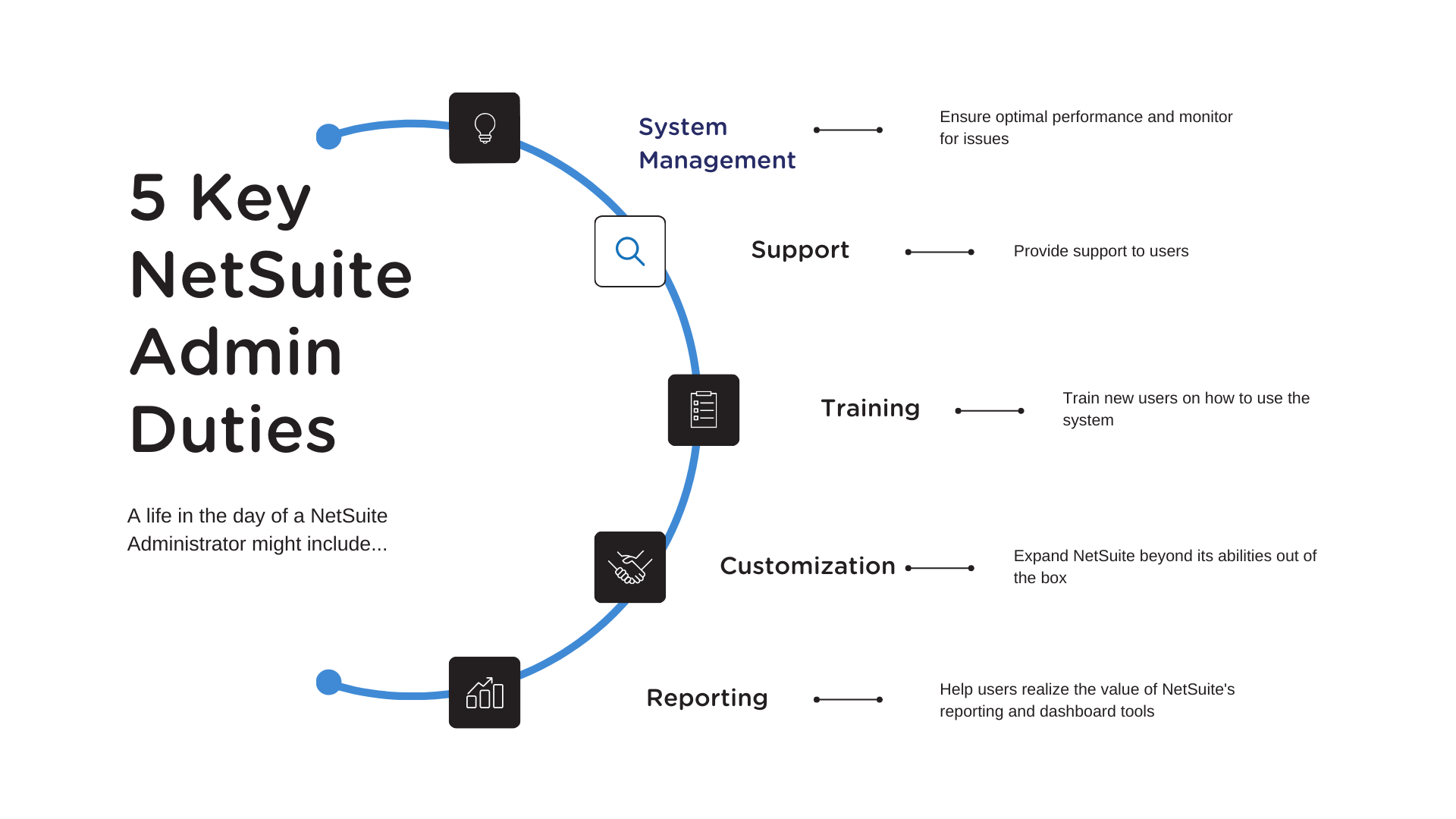- CALL : (+1) 407-273-1001
- Main Office : (+1) 407-273-1001
- NetSuite NetSuite Administration
- Aug 02
- 8 mins read
What is a NetSuite Administrator? (Quick 2023 Guide)
In the world of ERP, the role of the NetSuite Administrator is indispensable. As more businesses begin to embrace cloud ERP and NetSuite, they will need talented system managers with NetSuite experience who can proficiently navigate NetSuite’s comprehensive features and align them with their unique objectives.
This article aims to guide you through the complex yet fascinating role of a NetSuite Administrator, shedding light on their crucial duties and the immense value they bring to an organization. As we delve deeper, we’ll critically evaluate the pros and cons of hiring an in-house NetSuite Administrator versus outsourcing the role. Understanding the distinct benefits and potential challenges of both options can equip you to make a strategic decision that best aligns with your business goals.
Stay with us as we explore the world of NetSuite Administration, offering you an insider’s view that will empower you to leverage this role for the optimal utilization of your NetSuite platform.
To start off lets summarize:
What is a NetSuite Administrator?
A NetSuite Administrator is a professional who manages, maintains, and customizes the NetSuite ERP system to suit a company’s specific needs. They handle tasks such as user support, system customization, integration, and reporting, ensuring optimal business efficiency and growth. A NetSuite Administrator is a key figure in any organization that uses NetSuite. They serve as the linchpin connecting the organization’s operational needs with the technical capabilities offered by NetSuite.
Fundamentally, the role involves managing, maintaining, and customizing the NetSuite system to fit the company’s needs. Their responsibilities range from managing user access, creating and modifying fields, and tailoring record types, to adjusting page layouts and workflows. They also monitor system performance and troubleshoot any issues that arise, ensuring that operations continue without disruption.
Another integral part of a NetSuite Administrator’s role involves providing user support and training. They’re the first point of contact when team members have queries or face challenges while using NetSuite. By offering the necessary training and guidance, NetSuite Administrators enable all users to interact effectively with the system, enhancing overall productivity and system utilization.
To be effective in this role, a NetSuite Administrator should have a strong foundation in IT and a thorough understanding of business processes. Certifications, like the NetSuite Administrator Certification or SuiteFoundation, can significantly enhance their technical skills. Moreover, soft skills like problem-solving, excellent communication, and a keen understanding of business needs are invaluable for a NetSuite Administrator.
Now that we have a clearer understanding of what a NetSuite Administrator does, let’s examine the strategic decision many businesses face: hiring an in-house administrator or outsourcing the role. In the following sections, we’ll delve deeper into the advantages and potential challenges of both options.
Deep Dive into a NetSuite Administrator’s Daily Duties

The day-to-day tasks of a NetSuite Administrator are multifaceted and dynamic, reflecting the diverse nature of the role. This section offers a more granular view of their responsibilities, providing a snapshot of how their work shapes the overall efficiency and growth of the business.
- System Management: This involves routine system checks and monitoring to ensure optimal performance. Administrators configure NetSuite’s settings to align with the company’s processes, which might include managing user roles and permissions, setting up dashboards, or adjusting workflows. They also stay up-to-date with NetSuite updates and enhancements, implementing relevant ones within their organization’s system.
- User Support: As the primary point of contact for all things NetSuite, administrators spend a significant part of their day resolving user issues. This might range from troubleshooting minor technical glitches to providing guidance on how to use different features. Their goal is to ensure a seamless user experience, reducing system-related frustrations and boosting productivity.
- Training: A NetSuite Administratorplays an essential role in training staff to use the system effectively. This might include creating user manuals, running training sessions, or even offering one-on-one guidance. Their aim is to ensure that all users, whether new hires or existing staff, are confident in using NetSuite.
- Customization and Integration: One of NetSuite’s strengths is its customizability. NetSuite Administrators leverage this, tailoring the system to their organization’s specific needs. They might modify fields, forms, records, or workflows. Additionally, they work with other IT professionals to integrate other software applications with NetSuite, thus enhancing its functionality.
- Reporting: NetSuite Administrators create and manage customized reports and dashboards, offering crucial business insights. They work closely with decision-makers, providing them with real-time data that can inform strategic decisions.
Up next, we’ll examine the advantages and potential challenges of hiring a NetSuite Administrator in-house versus outsourcing the role.
Hiring an In-house NetSuite Administrator
Choosing to hire an in-house NetSuite Administrator comes with its unique set of advantages. Having an expert within the organization can offer direct control and faster communication. The administrator would be deeply familiar with the company’s culture, operational style, and specific needs, allowing for a more seamless implementation of the NetSuite platform.
Additionally, an in-house administrator would be dedicated solely to your business, meaning they can focus entirely on optimizing your NetSuite system without distraction. They can also quickly respond to system issues or user queries, minimizing downtime and increasing overall productivity.
However, hiring an in-house NetSuite Administrator also presents potential challenges. Finding the right talent with the necessary technical skills and business acumen can be a time-consuming and costly process. Once hired, the cost of maintaining an in-house administrator includes not only their salary but also the ongoing costs associated with benefits, training, and development.
Outsourcing a NetSuite Administrator
On the other hand, outsourcing a NetSuite Administrator presents an alternative that many businesses find attractive. It can be a more cost-effective solution as it eliminates the need for recruitment costs, benefits, and training expenses associated with hiring in-house.
Outsourcing also provides access to a broader pool of talent, with the possibility of hiring experts who have experience in your specific industry or have worked with businesses similar to yours. This expertise can prove invaluable in optimizing your NetSuite system to your unique requirements.
Furthermore, the flexibility that comes with outsourcing can be beneficial, especially for businesses that need to scale up or down based on demand. Outsourcing firms often provide 24/7 support, ensuring continuous system oversight that might be challenging with an in-house team.
However, outsourcing isn’t without its drawbacks. It may offer less control over daily operations compared to having an in-house administrator. Also, there might be potential security concerns, and timezone differences or communication barriers could affect the efficiency of response times and system management.
If your company highly values direct control, faster communication, and close cultural fit, hiring in-house may be the best option.
On the flip side, if cost-effectiveness, flexibility, and access to a wide talent pool are your priorities, outsourcing could be the better choice. However, you’ll need to carefully manage potential security concerns, possible communication barriers, and the perceived lack of control.
Choosing a NetSuite Administrator
When selecting a NetSuite Administrator, whether in-house or outsourced, there are a few critical factors to keep in mind.
- Technical/Functional Expertise: They should possess strong technical skills and have a deep understanding of the NetSuite platform. Certifications such as NetSuite Administrator Certification or SuiteFoundation can attest to their technical proficiency.
- Industry Knowledge: It’s beneficial if they have experience in your specific industry. This will help them understand your unique business needs and customize the NetSuite platform accordingly.
- Business Acumen: A good NetSuite Administrator should understand your business goals and processes, and be able to align these with the functionalities of NetSuite.
- Problem-Solving Skills: As they’ll often need to troubleshoot system issues or adjust workflows, strong problem-solving skills are essential.
- Communication Skills: As a point of contact for NetSuite users within your organization, they need excellent communication skills to provide support and training.
- Proven Track Record: Check their history of previous projects or roles to ensure they have a proven track record of managing NetSuite effectively.
- Availability and Support: They should be able to provide prompt support when needed and be readily available to address system issues or user queries.
- Cost: Consider their fee structure or salary demands and ensure it aligns with your budget.
- Cultural Fit: If hiring in-house, ensure they will fit well within your company culture and align with your core values.
NetSuite Administrator Hiring Test
To help NetSuite users who want to hire their own in-house administrator we have created a test users can give to applicants to test their platform knowledge. Let us know in the comments if you like this sort of thing and we will add more questions.
- Scenario 1: The sales team has requested a new custom field on the sales order form to track a new piece of information about each sale. How would you go about adding this field and making sure the sales team can view and edit it?
Ideal Answer: I would first create the custom field through Customization > Lists, Records, & Fields > Transaction Body Fields > New. I would ensure the field applies to sales order and is visible, editable, and has the right label. Then, I’d assign the field to the relevant roles, ensuring that it appears on the sales order form for those users. - Scenario 2: A user is unable to access a particular report which they need for their work. They have the necessary role permissions but are still unable to view the report. What would be your approach to troubleshooting and resolving this issue?Ideal Answer: My initial step would be to reconfirm the user’s role and permissions. If they are correct, I would then check if the report is set to ‘public’ or if specific sharing settings are preventing this user’s access. It could also be a potential browser issue, or possibly a field or criteria in the report that the role doesn’t have permission to access.
- Scenario 3: The company decides to adopt a new third-party software that needs to be integrated with NetSuite for seamless data exchange. Describe the steps you would take to facilitate this integration.
Ideal Answer: The integration process would generally start with gathering business requirements. I would then identify the data to be exchanged, frequency, and mapping. If the software has a prebuilt connector with NetSuite, we could leverage that. Otherwise, we would use SuiteTalk web services API for the integration. I’d set up error logs for data validation and schedule a process for regular data sync. - Scenario 4: A sudden change in business process requires a modification in a key workflow. What steps would you follow to make sure the workflow aligns with the new process?
Ideal Answer: The first step is to understand the changes in the business process in detail. Then, I would identify the components of the workflow that need alterations. I’d modify the states, actions, or conditions in the existing workflow, or if needed, create a new workflow. Post-modification, I would test the workflow thoroughly in a sandbox account before deploying it to the live environment. - Scenario 5: The company is experiencing slow performance with their NetSuite system. How would you go about diagnosing the cause of this issue and what could be some potential solutions?
Ideal Answer: I would start by reviewing the system notes for any recent changes that might be causing the slowdown. I’d also check the performance metrics and SuiteAnalytics Workbook to identify any performance bottlenecks. Possible solutions might include optimizing search criteria, using SuiteScript effectively, or limiting dashboard refresh rates. - Scenario 6: The finance department needs a custom report that includes data fields from different NetSuite modules. How would you go about creating this report?
Ideal Answer: To create a custom report, I would navigate to Report > New Report. I’d select the primary record type and then join the other necessary records. I would then add the required fields from each record type, set the sorting and grouping criteria, and define any needed filters. Finally, I’d check the report results and adjust the report layout if necessary.
Final Thoughts
I hope you found this article informative and helpful whether you are trying to become a NetSuite admin or you are looking to hire one. If you have any questions or think there is something I should, leave a comment to let me know and I will do my best to answer. Also, to learn more about how you can get NetSuite Administrative Support you can view our services here.
Jeremy McCourt is an content producer in the enterprise software industry that focuses on NetSuite and related cloud-based software solutions.
Related Posts

NetSuite Training 101 (The 2023 Complete Guide)
NetSuite training is an underrated and often overlooked part of the NetSuite ecosystem. In this article, we do what we can to break down why NetSuite training is a critical part of NetSuite users finding…
- Aug 21
- 6 mins read

What is NetSuite Customization? The 2023 Complete Guide
NetSuite, as a leading cloud-based ERP system, has gained immense popularity among businesses worldwide. However, to truly harness its potential, customization is often necessary. In this comprehensive guide, we delve into the world of NetSuite…
- Aug 16
- 6 mins read
